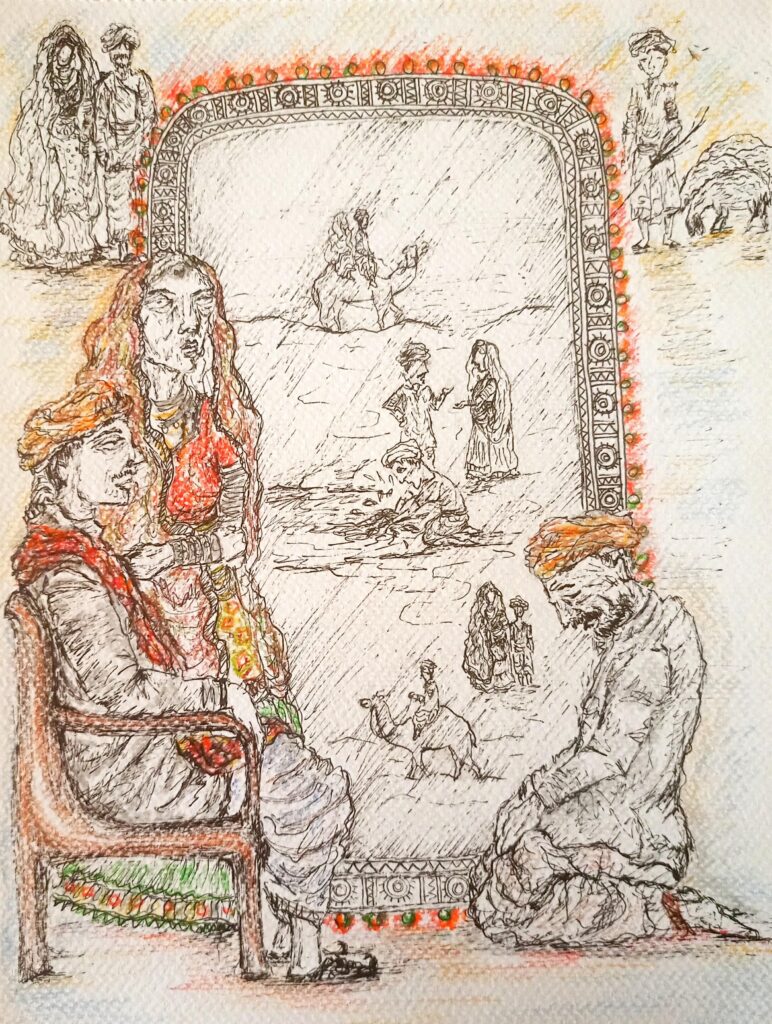
One day, he traveled from Sambhar to Sindh to sell salt. His wife, the Banjaran, accompanied him on a camel. On the way, they came across a boy whose sheep were grazing on the pastures.
As the couple looked on, the boy went over to the pond near the pastures and stretched down by the pond. He lapped up the water from the pond just like an animal would.
The Banjara pointed this to the Banjaran and remarked that it showed the boy’s character as a shepherd. Not quite sure if that was the case, the Banjaran replied that it had more to do with the boy’s company.
Lakhi Banjara replied that shepherding cattle was in the boy’s blood, so it was something hereditary. The Banjaran stood her ground and said that the boy ought to behave like a human being. She contended that he could learn to behave if he had access to education. She added that the shepherd boy could get as good at business as her husband.
Incensed at this remark, Lakhi Banjara asked her how a boy like that could be as good as him. The Banjaran declared that the boy wouldn’t just equal her husband, but one day surpass him and become his boss.
The angry Banjara left her in the wild and went on his way to Sindh. Meanwhile, the Banjaran went over to the boy and convinced him to listen to her. She told him that he needed to learn to read and write. The Banjaran took him to a nearby village and got him new clothes from the market. She then cooked and served him good food.
Despite the difficulties, she kept at it. Eventually, she managed to teach the boy to read, write, behave, and converse with others. She even taught the boy to ride a horse. The Banjaran also made him well versed in handling everyday affairs. Over the years, the boy grew up to be a well-groomed man.
He would attend the royal court and interact with the top officials with aplomb. Every day, the shepherd boy would relate the day’s events to the Banjaran, who would occasionally help her resolve some tricky issues.
One day, the shepherd accompanied the king on a hunting trip. In the woods, the king happened to move away from his entourage while chasing a deer. However, the boy, who had been following him closely, offered the king his own food and water. He also kept guard while the king slept on the saddle of his horse. Pleased with the boy, the king offered him a reward. The boy replied that he needed to consult his mother before deciding what he wanted. The king agreed.
As instructed by his mother, the boy told the king that he wanted to serve as the toll tax official. This was a rather prestigious position those days, for all merchants crossing the border with their goods had to pay the taxes to and get the relevant permits from the tax official.
Being a clever woman, the Banjaran knew that, sooner or later, Lakhi Banjara would have to cross the border with his goods. She instructed the boy to not let any merchant into the country without informing her.
As expected, Lakhi Banjara soon showed up with his goods. The Banjaran asked the boy to keep her husband waiting for three days before letting him pass.
Frustrated after the inexplicable three-day wait, Lakhi Banjara went to the boy’s place. As a high-ranking official, the boy sat on an elegant chair. The Banjara bowed and pleaded with him to clear his toll tax so the delay wouldn’t hurt his business anymore.
That was when the Banjaran walked in. The boy touched her feet. Lakhi Banjara immediately recognized his wife. The Banjaran then told her husband that the boy standing before him was the same shepherd she had groomed into this fine young man.
The Banjara now remembered the boy and apologized to both his wife and the erstwhile shepherd.
Folktale Source: Books Ameya
Illustration by Amrapali

